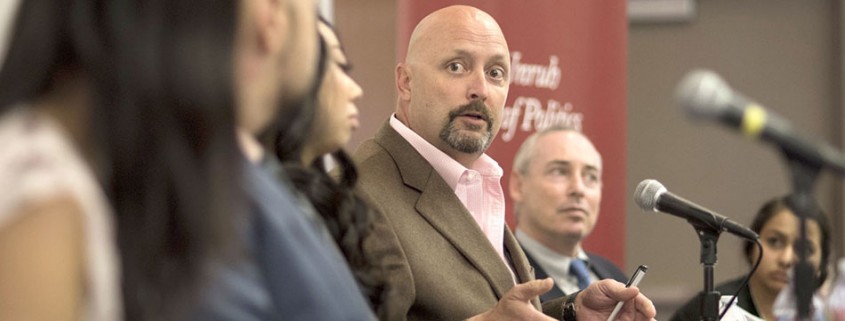Students Talk Back focuses on US economy and wages
This week’s Students Talk Back series, entitled “The United States’ Economy” and hosted by the Jesse M. Unruh Institute of Politics, focused on the effects of minimum wage on the local and national economy. The panel was on Wednesday afternoon in the Ronald Tutor Campus Center.
The panel consisted of Douglas Herman, political strategist from The Strategy Group; David Englin, executive vice president of BizFed, a grassroots alliance advocating for stronger public policies that increases regional economy; Jessica Yu, finance director of the USC College Democrats; and Sarah Dhanaphatana, secretary of the USC College Republicans and Daily Trojan deputy features editor.
Dan Schnur, director of the Unruh Institute, was joined by Daily Trojan editorial director Sonali Seth to moderate the panel.
One of the primary topics discussed by the panel was the effects of increasing the minimum wage to various sectors and whether it is advisable to do so. Englin argued that his alliance’s 135 business membership is indifferent to the minimum wage increase, according to its annual survey.
“Sixty percent of our members told us that they were not concerned whether the minimum wage increases. About 20 percent that are included in that 60 percent thought that increasing the minimum wage might be good for their businesses,” he said. “So, especially in California, where the general cultural baseline is much farther in the left than the rest of the country, I think the business community broadly is a little less black and white in these issues.”
However, he was quick to add that other small business owners, such as restaurant and retail owners, are concerned about reducing jobs if the minimum wage spikes, aggravating the broader issue on poverty.
“We would argue that raising the minimum wage is not mathematically the right approach to addressing poverty because raising somebody from $10 to $15 an hour when you’re not doing anything about the housing costs, transportation costs, all the other costs of living in L.A. is not actually lifting them out of poverty.”
Rather than increase the minimum wage, Englin suggested that resources be put into education, training and creation of jobs to address the issue of poverty.
Herman agreed that raising the minimum wage is not a solution to poverty. He argued that the current minimum wage in California of $9 per hour, which is above the federal minimum wage of $7.25 and will increase to $10 in January, is not guaranteed to lift someone out of the federal poverty level. The stagnation of the minimum wage, not keeping up with inflation, has only worsened income inequality.
“What we’re seeing is that the disparity between the pay at the top and the pay at the bottom is growing greater and greater while we continue to stagnate and not raise the minimum wage,” Herman said.
He added that while increasing the wage floor is part of the solution, it is not the only solution.This nuanced issue of minimum wage is only a facet of broader social issues such as poverty, income inequality, housing and unemployment.
Dhanapatana, the only Republican on the panel, said the discussion should be refocused on improving access to affordable housing so that workers can continue to afford to live in cities, such as Los Angeles, that have a high cost of living.
“I think what we’re seeing is that the minimum wage increase seems like a great solution, in the moment,” she said. “We’re really helping out these people get back on their feet and while I don’t disagree with that, I think if we’re looking long term, we’re looking at where the money is actually going and how much [it’s] benefiting their household, then you can see that affordable housing plays a larger role in this scenario.”
Greyson Peltier, a junior majoring in business administration, said he found the event informative.
“It did get me a lot of different perspectives on the issue,” he said. “Obviously, it’s a bit more slanted because there’s only one Republican and three Democrats in the panel. It was interesting to hear about the impacts of these larger economic issues on the local community especially as it relates to housing. That’s one of the things that I was not as familiar with.”

